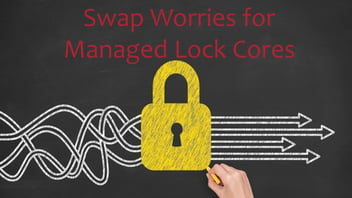Commercial Key Cores: Traditional IC Cores vs. Smart Locks
For as long as people have wanted to keep valuables safe, there have been locks and keys. While the shape, size, and security of locks have changed over time, their basic function is still the same: Needing a key to open a lock.
Or at least, that's how it used to be. With advances in technology for commercial key cores, new options for locks have cropped up. Now locks can be opened or closed on-location with a passcode or remotely with a digital app. These advances have led to a wider selection of lock types to suit different security needs. Now you have access to both types of commercial key cores: traditional locks and smart locks.
 Traditional Locks with IC Cores
Traditional Locks with IC Cores
These are the locks you’re most familiar with. A physical key turns the lock cylinder, often a small format interchangeable core or ic core, and unlocks the lock.
Traditional Locks with IC Cores Pros
Price: Traditional locks are relatively inexpensive. You’ll typically spend less to install a set of traditional locks as opposed to a set of smart locks.
Simplicity: Because of its simple design, a traditional lock will take the fewest steps to install and use. There is no programming codes or logging in, connecting the lock to a WIFI signal, no need to worry about batteries dying, and no concern about forgetting a passcode or forgetting to change a code when someone leaves. You just turn a key, and the lock operates.
Security: Since only a certain key shape can open a lock, no other key can fit unless it’s keyed to the lock or the lock is keyed to it. In the case of multiple accessible keys and master keys, you can control access by assigning and tracking keys to a certain group of people.
Traditional Locks with IC Cores Cons
Keys Get Lost: If you want to use a lock, you need a key. But keys are small, and they can be easy to lose. And if you lose a key, you’ll end up having to call a locksmith to get your locks rekeyed. With the loss of a master key, this can get very expensive very quickly unless you have user-rekeyable locks.
Vulnerability: Traditional locks can sometimes be picked with a little know-how or by using a bump key. Fortunately, you can find locks that are more difficult to pick or key-bump.
No Remote Control: To access a lock, you have to be physically on-premises and have the right key. If you forget your key or leave a door unlocked, you can’t fix the problem until you’re in front of the door with the key in your hand.
Smart Locks
Relatively new to the scene, smart locks can seem like automated versions of traditional locks. The locking mechanism may be the same, but the main differences are that smart locks utilize a passcode to open the lock instead of a physical key being issued, and some can be accessed remotely and electronically. They generally require batteries and a connection to a WIFI signal.
Most smart lock systems also have a physical lock and key to act as a manual override. Commercial smart locks can be fitted with interchangeable cores (SFIC of FSIC cores) for added security and speedier rekeying.
Smart Lock Pros
No Need for a Physical Key: You won’t have to worry about keeping track of a key. All you need is a passcode or passkey.
Physical Key as a Backup: Most models operate with a digital passcode and have a physical key lock. With these, you can still operate the lock with a key if you forget your passcode.
Remote Access: Smart locks with a network connection often work with an app on your mobile device or from a computer, giving you the ability to lock and unlock a door from anywhere with an internet connection. This can come in handy if you don’t have your key or if you forget to lock up before you leave.
Smart Lock Cons
Higher Price: Compared to traditional locks, the price of installing smart locks is significantly higher.
Technical Difficulties: Unlike a traditional lock, which is ready to use the moment it’s installed, a smart lock requires more steps and management. Many smart locks require a network connection, they can potentially run out of battery life, or you could simply forget your passcode. But if you choose a smart lock system with a manual key override, you can still operate the lock as long as you have the physical key.
Talk to an Expert to Determine the Best Commercial Key Core
Which type of lock is right for your organization? The answer depends on your security needs. Your best bet is to speak with a key control expert at InstaKey. We can help you find the right security solution for your organization.





